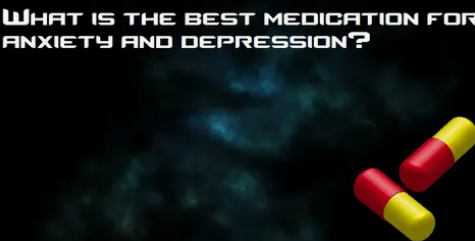Anxiety and depression are two of the most common mental health disorders worldwide. According to the World Health Organization, over 300 million people suffer from depression, while anxiety disorders affect nearly 264 million individuals globally. These conditions often occur together, creating significant challenges for those affected. Fortunately, modern medicine offers a variety of anxiety and depression medications that can help manage symptoms and improve quality of life. Understanding these medications, their benefits, and potential side effects is essential for anyone considering treatment.
What Are Anxiety and Depression Medications?
Anxiety and depression medications are pharmaceutical treatments designed to correct chemical imbalances in the brain that contribute to mood disorders. These medications target neurotransmitters—chemical messengers such as serotonin, norepinephrine, and dopamine—that influence mood, sleep, and overall emotional regulation. While therapy and lifestyle changes play an important role in treatment, medications can be a crucial component, particularly for moderate to severe cases.
Common Types of Medications for Anxiety and Depression
Several classes of medications are commonly prescribed for anxiety and depression. Each works differently, and the choice depends on the patient’s symptoms, medical history, and response to previous treatments.
1. Selective Serotonin Reuptake Inhibitors (SSRIs)
SSRIs are the most commonly prescribed medications for both anxiety and depression. They work by increasing the levels of serotonin in the brain, which helps improve mood and reduce anxiety.
Examples of SSRIs:
- Sertraline (Zoloft)
- Fluoxetine (Prozac)
- Escitalopram (Lexapro)
- Paroxetine (Paxil)
Benefits:
- Effective for long-term management of both anxiety and depression
- Generally well-tolerated with a lower risk of severe side effects
Potential side effects:
- Nausea
- Insomnia
- Sexual dysfunction
- Weight gain
2. Serotonin-Norepinephrine Reuptake Inhibitors (SNRIs)
SNRIs work similarly to SSRIs but also increase norepinephrine levels, which can enhance mood and energy. They are often prescribed for patients who do not respond fully to SSRIs.
Examples of SNRIs:
- Venlafaxine (Effexor XR)
- Duloxetine (Cymbalta)
Benefits:
- Treat both depression and anxiety
- Helpful for chronic pain associated with depression
Potential side effects:
- Increased blood pressure
- Dizziness
- Sweating
3. Benzodiazepines
Benzodiazepines are fast-acting medications primarily used for anxiety. They work by enhancing the effects of a neurotransmitter called GABA, which produces a calming effect.
Examples of benzodiazepines:
- Lorazepam (Ativan)
- Diazepam (Valium)
- Alprazolam (Xanax)
Benefits:
- Rapid relief from severe anxiety symptoms
- Can help with panic attacks
Potential side effects:
- Drowsiness
- Dependence and withdrawal issues
- Memory problems
Benzodiazepines are generally prescribed for short-term use due to their potential for dependency.
4. Tricyclic Antidepressants (TCAs)
TCAs are older antidepressants that are still used in certain cases. They increase serotonin and norepinephrine levels but tend to have more side effects than SSRIs or SNRIs.
Examples of TCAs:
- Amitriptyline
- Nortriptyline (Pamelor)
Benefits:
- Effective for severe depression
- Useful for patients who do not respond to newer medications
Potential side effects:
- Dry mouth
- Blurred vision
- Constipation
- Heart rhythm changes
5. Atypical Antidepressants
Atypical antidepressants do not fit neatly into other categories but are useful for certain patients. They often target multiple neurotransmitters and can be tailored to specific symptoms.
Examples of atypical antidepressants:
- Bupropion (Wellbutrin)
- Mirtazapine (Remeron)
Benefits:
- Fewer sexual side effects (especially bupropion)
- Can help with sleep and appetite issues
Potential side effects:
- Weight changes
- Sleepiness or insomnia
- Dry mouth
6. Beta-Blockers
Beta-blockers are sometimes prescribed off-label for anxiety, particularly for physical symptoms such as rapid heartbeat, shaking, or sweating. They do not treat depression but can reduce anxiety in specific situations like public speaking.
Examples:
- Propranolol (Inderal)
- Atenolol (Tenormin)
How to Choose the Right Medication
Choosing the right anxiety and depression medication requires collaboration between the patient and a healthcare provider. Several factors are considered:
- Severity of symptoms: Severe cases may require stronger medications or combination therapy.
- Medical history: Certain medications may be contraindicated for people with heart disease, liver problems, or other conditions.
- Previous medication response: If a patient has tried similar drugs, this guides future choices.
- Side effect tolerance: Some medications may cause side effects that a patient cannot tolerate.
It is common for patients to try multiple medications or adjust dosages to find the most effective and tolerable treatment.
Combining Medications with Therapy
While medications are effective, combining them with psychotherapy often produces the best results. Cognitive-behavioral therapy (CBT), mindfulness-based therapy, and other counseling approaches can help patients manage symptoms, develop coping strategies, and reduce the risk of relapse.
Tips for Taking Anxiety and Depression Medications
- Follow the prescribed dosage: Never adjust medication without consulting a healthcare provider.
- Be patient: Most antidepressants take 4–6 weeks to show full effects.
- Report side effects: Inform your doctor about any adverse reactions; dosage adjustments or alternative medications may be needed.
- Avoid alcohol and recreational drugs: These substances can interfere with the effectiveness of medications.
- Do not abruptly stop medications: Suddenly discontinuing medications, especially benzodiazepines or antidepressants, can cause withdrawal symptoms.
Conclusion
Anxiety and depression can profoundly impact daily life, but effective treatments are available. Anxiety and depression medications—including SSRIs, SNRIs, benzodiazepines, and atypical antidepressants—play a critical role in managing these conditions. The right medication, combined with therapy and lifestyle changes, can help individuals regain emotional balance and improve overall well-being.
If you or a loved one is struggling with anxiety or depression, it is essential to consult a licensed healthcare provider. With the right treatment plan, living a fulfilling, balanced life is possible.



